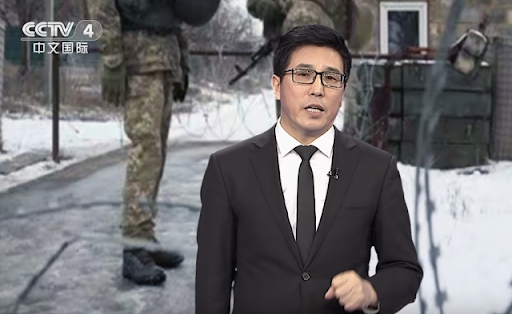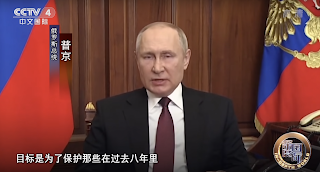Abstract: This article provides a close examination of a recent CCTV program on the Russian invasion of Ukraine and China-Russian relations in the wake of the war.
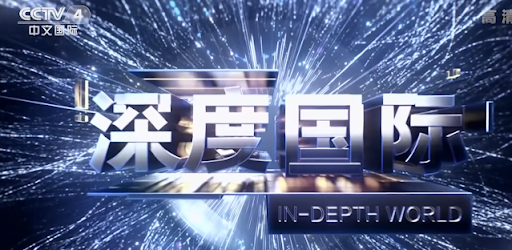 |
| CCTV’s Shendu Guoji “In-Depth World” |
I’ve been closely monitoring Chinese TV news online to see how producers and on-air broadcasters navigate the sudden and severe Russian invasion of Ukraine just weeks after Xi Jinping heralded a new era of Sino-Russian friendship on the opening day of the Olympics. How do China’s news experts present the kinetic militarized incursion of Ukraine without using the allegedly proscribed words “war” or “invasion” as per state policy?
It’s also of interest to see how high profile Chinese commentators and scholars explain China’s support for Russia, because whatever its merits, it’s a position that is little understood in the West.
If there was ever a taboo on uttering the word “war” it has been eased; indeed the word comes up at key moments during CCTV’s “In-Depth World” which is the program reviewed below.
As for the word “invasion,” it is noticeable only because of its aching absence. A viewer without access to other sources of information might not even realize that Russia has invaded Ukraine, though it’s clear that there’s some fighting going on.
CCTV4 is a Beijing-based satellite TV channel that can be viewed across China, especially in cities where satellite reception is commonplace, but it is primarily designed as a global channel with the mission to educate and entertain the Chinese diaspora. It broadcasts in Mandarin with some programming in Cantonese.
The February 26, 2022, episode of “In-Depth World” opens with scenes of the February 24 “bombings in Ukraine” followed by an introduction from the dapper Li Zhongmin who hosts the show from a huge sound stage in Beijing.
|
|
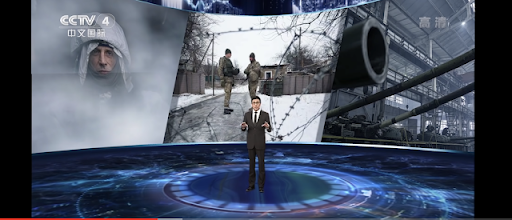 |
The theme of the 25-minute program is indicated in the vertical banner on the screenshot below.
“When Ukraine is broken, who feels the pain?”
A haunting notion, but the plaintive question is never really answered.
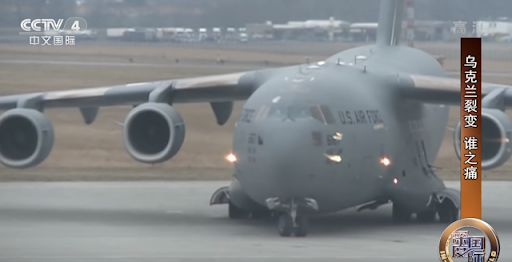 |
Russia’s invasion of Ukraine is introduced as if it were a force of nature as follows:
“War broke out suddenly. Ukraine started to experience bombing on February 24.”
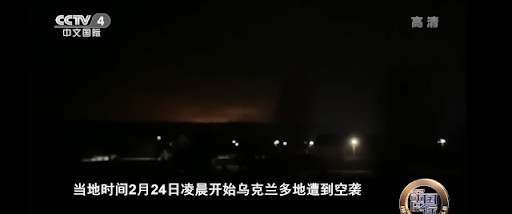 |
The introductory footage from the field is not put in a clear context, but no matter, the show quickly settles into a talking head format backed by rolling file footage. For the next twenty minutes, the narrator and various experts try to explain why war has come to Ukraine.
Hint number one: Russia is not at fault.
Hint number two: It has nothing to do with China.
 |
| Ukraine’s President Volodymyr Zelensky gets a cameo, but is treated as a villain for his stated desire to return Crimea to Ukraine, which crosses a red line for the Kremlin. |
Overall, the narration cleverly shifts blame for the attack away from Putin. Through misdirection and sleight of hand it manages to frame the US as the main culprit, essentially echoing Putin’s claim that “I had no choice, they made me do it.”
Apart from the newsy opening montage of the February 24 offensive, shown to music, and a few fleeting scenes on the ground in Kiev, the visuals mostly focus on the Russian point of view after that. Russian planes, military vehicles and ships, paratroopers are shown descending in air, though the images are file footage, probably culled from earlier military exercises, well before the war started judging from the bright green color of the grass.
|
|
 |
Wu Dahui, from the Institute of Russian Studies at Tsinghua University talks about Iskandar missiles and other weapons. He is supremely confident of Russia’s prowess. He says that up against these awesome weapons, the Ukraine defense, little better than local militia, doesn’t stand a chance. “Give it an hour, three hours, even ten hours, they lose.”
 |
Wu explains that Russia is in the fight because of red lines crossed, namely provocations in the Donbas region of Donetsk and Luhansk, (tentatively referred to as “so-called republics”) He describes Crimea as an integral part of Russia, so naturally provocations there would also merit a response. Wu also cites fears of Ukraine gaining nuclear weapons (Ukraine gave them up in return for security assurances from Russia, UK and US in 1994). Putin is shown signing off on “independence” of the Russia-controlled border territories, followed by pristine file footage of Russian tanks and aircraft.
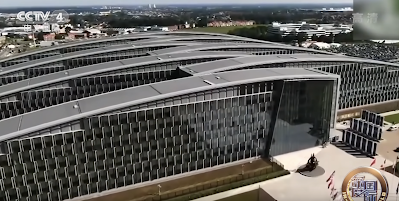 |
The scene then cuts to NATO HQ and what appears to be footage borrowed some some kind of NATO PR material. The infrastructure scenes are organized under the English-language titles: SEA, ROAD, RAIL, AIR, an example of which can be seen below:
|
|
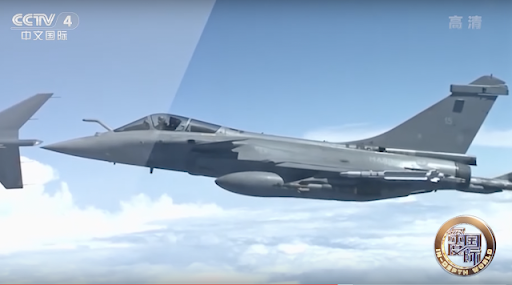 |
A US cargo jet is shown landing in Poland to deliver troops and equipment, along with scenes of a US aircraft carrier. We are told the US was making threatening preparations for war in mid-February, but when war broke out the troops just stayed in the background doing nothing; instead sanctions on Russia were announced.
Du Wenlong, an in-house CCTV commentator, is on next. He says NATO is composed of many countries and lacks unity to fight under a single command because of so many different views. Why should Europeans get involved in a bloody battle between US and Russia? And how many troops can they afford to send to the front?
UK, France and Germany are all wise to protect their own national interests and don’t want to suffer losses, meanwhile the East European countries are weak but on the front line.
Are these small countries really ready to risk it to take on Russia?
Du says US and NATO makes a lot of noise, they are all talk, no action. They did not heed Russian warnings; they did nothing to stop NATO from pressing east.
The result was that Russia was cornered, and in the end “had no choice.”
 |
Or, as The Wall Street Journal is quoted (in Chinese) as saying,
“Europe has reverted to a Cold War posture.”
 |
| Putin is shown in his palatial office signing the documents that unilaterally recognize the republics of Donetsk and Luhansk (both carved from Ukrainian territory). |
The two new Donbas republics are said to have welcomed the news of the signing with joy as the people waited eight long years to get recognized as “independent.” Putin’s announcement is celebrated with scenes of fireworks and joyous scenes on the street. A man in the street in Luhansk is asked how he feels.
“Our leaders asked for us to be recognized as independent. We are so happy.”
|
|
 |
The narrator goes on to explain the key industries and economic importance of Donbas, a part of what was once Ukraine that has deep Russian roots, with 40% of the population ethnic Russian. To the backdrop of scenes of the bucolic countryside and impressive infrastructure of modern industry we are told that this rich region is “vulnerable to outside interference.”
It is pointed out that the Ukraine government initiated a bloody struggle in response to the Donbas region returning to Russia, and that, among other outlandish ideas, Zelensky expressed the hope that Ukraine could join NATO in 2022.
Did that leave Russia with any other choice?
Russia is said to have been alarmed by the prospect of NATO jets and nuclear weapons at its front door. Putin is on screen again, saying that Ukraine “shamelessly tricked us.” He repeats his call on NATO to halt eastward expansion, complaining that NATO shows Russia none of the respect due to a great country. He says NATO is not responsive to Russia’s demands, and that’s his bottom line, the red line. Russia can’t tolerate being treated so dismissively, so that was the last straw. Putin had no choice but to attack.
It is explained that no more progress could be made with the intransigent US and NATO, so the time to act was now, before even more was lost. It is also noted that the US sends Ukraine all kinds of weapons but repeatedly says it won’t send in troops.
Ding Yifan, from a State Council think tank says the US strategy is to keep the region in perpetual crisis, thus it is the US who is behind the tensions in Eastern Europe. The US is desperately trying to justify its own role and the existence of an expansive NATO.
The program makes a surprise cut to Fox News, showing footage of the Tucker Carlson show during which former congresswoman Tulsi Gabbard says, “They actually want Russia to invade Ukraine….it cements Europe in place.”
 |
The Fox News footage is disturbing on a number of levels, not least of which because Tucker Carlson has a record of demagogic comments to activate a right-leaning base simmering with resentment. Having Tulsi Gabbard as a guest is a masterstroke, for it unites his right-leaning populism and provocative defense of Putin with her left-leaning anti-imperialism in a way that plays into the hands of team Trump whose cavalier pro-Russian views have suddenly come into sharp focus and need some explaining.
It’s also disconcerting to realize that anyone who criticizes US policy for honest, home-grown reasons might one day be quoted on TV by a country on a war-footing with the US, and thus be dismissed as a “Tokyo Rose” or someone who carries water for the national enemy.
I don’t think Tulsi Gabbard got the best of this conversation, but there should be room for discussing the very issue she raises, which is how NATO expansion in Eastern Europe has raised new tensions for some, even while giving a sense of security to others.
The Tsinghua professor goes on to talk about the merits of Finlandization. This refers to the Cold War accommodation in which a weaker power agrees not to oppose the foreign policy of a greater power in exchange for nominal independence. Unfortunately, as he notes, Ukraine chose the opposite path. The result is that Ukraine gets poorer, its people neglected, and there’s a lack of food and medicines, all things that Russia could presumably help with. What’s more, the currency is unstable.
Man on street: “America only pretends to care about us. They’re using us, it’s an outrage.”
Hong Yuan, a Chinese Association of Social Sciences military researcher says the US benefits from draining Eastern countries of capital. Capital flees to the US, and the US benefits at the expense of others. He says, “the US treats Eastern Europe like cannon fodder.”
Host Li Zhongmin concludes the program by saying the conflict is turning into a war.
The US created these tensions, he adds, and is disgracefully manipulating things for its own benefit. The crisis wasn’t created in one day. The US, for the sake of saving NATO, and its own benefit, stirred up the Ukraine-Russia war. This shows how the US is indifferent to life and death and survival of other nations in its desire for hegemonic domination of the world economy.
“Whoever foolishly follows the US becomes a pawn to be discarded.”
 |
The camera zooms out on host Li Zhongmin and the theme music for the show’s ending rises to a crescendo.
An end note for the show about Ukraine’s sorrow is written out on a black screen:
“UKRAINE SPRING WILL BE UNUSUALLY COLD THIS YEAR”
 |
Any student of Communist history will appreciate a certain resonance with the invocation of “Ukraine Spring.” Prague Spring of 1968, which saw Soviet tanks roll into Czechoslovakia followed by massive arrests and the assertion of Kremlin control, is a clear antecedent, but not the kind of spring that the producer of an explicitly pro-Russia Chinese TV program is likely to have had in mind when the end-note was inserted. Still it stands as a wistful reference to the passage of the seasons, a tradition that has deep cultural roots in East Asian culture and adds a poetic touch.
There’s the further irony, of course, that “Beijing Spring” was the name of a dissident movement that lambasted Deng Xiaoping’s version of Chinese communism in the early 1980’s. The name Beijing Spring also regained notable traction during the protests at Tiananmen in 1989 because the protests literally took place in Beijing in the spring. The movement was later revived by a new generation of dissidents including Wang Dan, Teng Biao, Gao Zhisheng and Hu Ping in the 1990s following the crackdown at Tiananmen.
Because it is not uncommon for China’s experienced state media workers to work under the pressure to conform to the latest government line, sometimes grudgingly, it would be tempting to read a note of warmth or hope in the unexpected invocation of a cold Ukraine Spring, but it could also be a chilling warning. In the CCTV news reports to date, there is not much indication of deviation from Xi Jinping’s position which posits Putin, and his country, as a fast friends of China, come what may.
China has to date shown no intention to join the US and European-led sanctioning of Russia, which it regards as “illegal and unilateral” even after nearly every nation on earth condemned the Russian invasion of Ukraine.
However, China’s decision to abstain on the US-led Security Council resolution to condemn the Soviet invasion may be regarded as a ray of light since it falls short of voicing support. A handful of other nations, reluctant to get caught in the crossfire of what looks to be a dramatically worsening US-Russia spat, including Vietnam and Pakistan, abstained for reasons of their own.
Xi Jinping’s current hands-off policy on the invasion of Ukraine, from the start firmly synchronized with Putin, if only in formal terms of the February 4 Joint Statement of the Russian Federation and the People’s Republic of China, is subject to change if it becomes unsustainable for reasons of political isolation, economic pressure or differences of opinion in the Politburo.
Leading Chinese banks have already shown hesitation to do business with Russia if such cooperation falls under sanction. In media terms, however, there has been little pushback, and CCTV is hewing close to Foreign Ministry guidance which sees Russia as an important balancer, and economic backstop, at a time when the US Indo-Pacific initiative seeks to isolate and contain China.
A recent social media posting allegedly issued by the Chinese Embassy in France used the proscribed term “illegal invasion” in a tweet, which would be a significant break with Beijing’s stylebook, though perhaps it was a hack. In any case, the term was quickly removed.
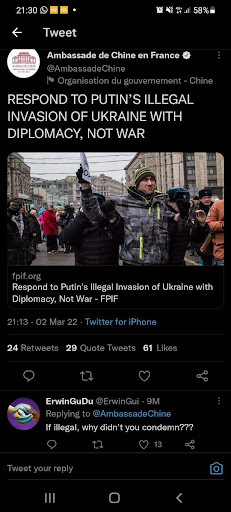 |
This report was completed on March 2, 2022.



